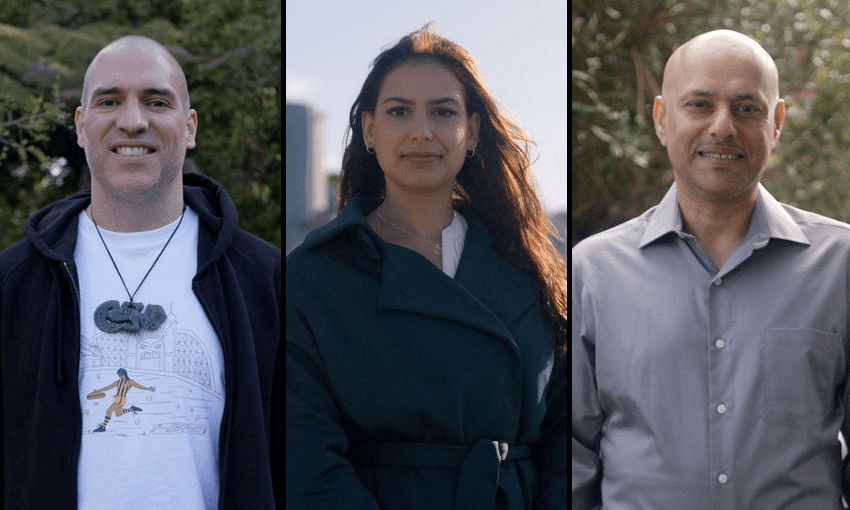Today The Spinoff launches Ako, a new series made in partnership with Spark NZ to highlight their Kupu app, with a piece introducing three very different te reo Māori learners.
Despite being indigenous to Aotearoa, the history of te reo Māori is a fraught one – it wasn’t until the late 1980s that it was even designated as an official language of this country. Decades of advocacy in the face of adversity, however, first ensured that te reo would survive the assault of colonisation, then restored the status of the language. Now, individual engagement is riding a wave of popularity.
Long-term education and information initiatives have helped to revitalise and modernise te reo, and between free classes, online resources like the Te Aka Māori dictionary, and tools like Spark’s translation app Kupu – which uses Google-powered augmented reality tech to identify objects captured by users’ phone cameras, then quickly translate their names into te reo – prospective learners have access to a huge range of resources to facilitate their study. It’s never been cooler to kōrero.
Ako is the concept of reciprocal learning which is central to education in te ao Māori. The word can be used to refer to both teaching and learning, with both students and their tutors considered to be equal participants in the process of fostering knowledge and building a collective understanding. It’s that principle which guides this series – each of the three individuals profiled in the Ako series has a personal reason for wanting to learn te reo Māori, but each sees their practice as a part of something fundamentally larger.
For Simon Day, it’s a way to give his children a connection to the culture of their tīpuna. For Jacinta Gulasekharam, it’s honouring a personal responsibility to the language. And for Haider Khan, it’s about fostering a genuine connection to the whenua that he now calls home. In our new series Ako we introduce these three New Zealanders, drawing a vivid picture of each of their te reo Māori journeys and examining why learning the language is so important to them.
Growing up in the central suburbs of Auckland, Simon Day was always aware of his taha Māori, but felt disconnected from his Ngāti Hikairo whakapapa. A big part of that disconnection was because te reo Māori never felt accessible to him.
“The language always felt out of reach. That connection to te reo, to my turangawaewae, was cut off by colonisation.”
As an adult Day, the commercial director at The Spinoff, has tried a number of times to start learning the language. In December he found fresh motivation with the birth of his twin sons. He sees the opportunity to teach his boys te reo Māori, and learn with them, as a way to help connect his family to their whakapapa.
“It’s something I want them to have. Having the language gives the boys the opportunity to understand where they come from and who they are.”
His family lives in the rainforest of the Waitakere Ranges, the power and precariousness of New Zealand’s natural environment are all around them. That proximity only makes the potential of te reo Māori feel more crucial.
“Such an important part of language is the way that it provides an insight into a culture. That’s one of the things I hope the boys get from te reo Māori; a cultural understanding of concepts like kaitiakitanga.”
This content was created in paid partnership with Spark NZ to highlight their Kupu app – to learn more and to download Kupu, click here.
For Jacinta Gulasekharam, a Wellington-based entrepreneur and co-founder of period poverty not-for-profit Dignity, the motivation for her te reo Māori journey was a simple one.
“Each year I make big goals for myself, and one of them for 2020 was to learn and to be able to confidently say my mihi.”
She’s since signed up for night classes, and although she’s only just started learning, Gulasekharam is adamant that, for her, learning te reo is a life-long mission. “I’ll never end this journey; there’ll always be words for me to learn and to understand in a deeper way. The further I get along, the more I’m going to feel connected to Aotearoa.”
That notion of connection is an important one for Haider Khan. A client lead at Spark, he’s been attending te reo Māori lessons facilitated by the Auckland University of Technology for a year and a half, an experience he describes as an honour. Born in Pakistan, he says that engaging with the language and with tīkanga Māori more broadly has revealed strong similarities between the two cultures.
“There’s a concept in te reo Māori called manaakitanga, which is about care and hospitality; that’s fundamental to our culture, where we come from.”
Although each of our ākonga have come to te reo Māori from a unique place, and although each has distinct goals, they share a belief in why the language is important and the perspective it gives them – as Khan says, “It’s not just the te reo part, it’s te ao Māori.”
“By being on this journey, I have a strong feeling of association with the whenua. It’s allowed me to connect at a deeper level. It’s literally changed my life.”


